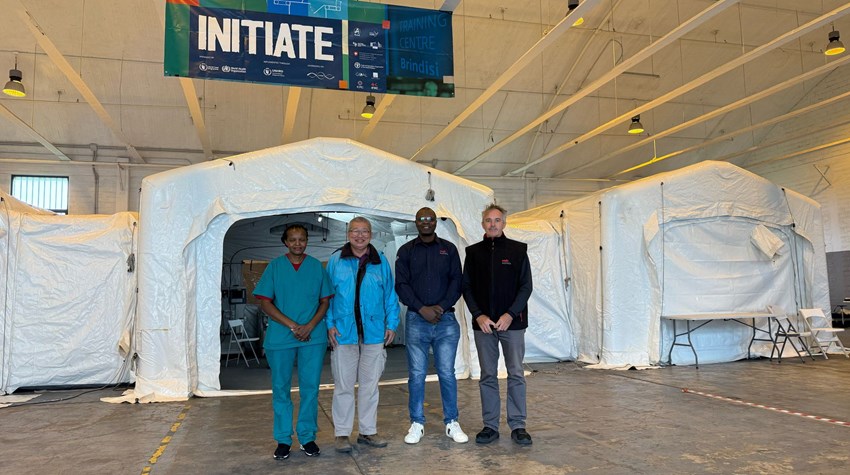The training aimed to enhance the capacity of Standby Partners and IHP experts through a structured training and simulation exercise. The exercise ultimately equipped participants with practical training to set up and operationalise Ebola and Marburg treatment centres, improving readiness for future outbreaks.
Participants were all specialists in WASH, logistics, or infection prevention and control who are actively engaged in or have the potential to be deployed for Ebola and Marburg outbreak responses, contributing their technical expertise to ensure effective outbreak management and treatment centre operations. Five RedR Australia roster members – Alexis, Milka, Amari, Tai Ring and Neil – participated in this critical training, with four of them generously funded by the UK’s Foreign, Commonwealth and Development Office (FCDO).
The three-day intensive training, held at the UN Humanitarian Response Depot facility in Brindisi, brought together experts from over 10 partner organisations across 15 countries. Facilitated by specialists from WHO, UNICEF, WFP, MSF, ALIMA and other INITAITE2 partners. The hands-on nature of the training ensured that participants gained practical experience with the latest protocols and equipment for managing high-risk infectious disease outbreaks.

RedR Australia roster members taking part in practical scenario training.
Alexis highlighted the relevance of the training to field work, “This training has equipped me with technical knowledge and skills of the latest technology and practices for Ebola and Marburg outbreak response. I am equipped with tools and skills which will be used efficiently and effectively for any Ebola, Marburg, and/or cholera outbreak response.”
For Milka, the training represented more than just technical skill development: "This opportunity has not only expanded my technical expertise but also strengthened my confidence to contribute more effectively to humanitarian work. I am excited to put these new skills into practice”.
RedR Australia deeply understands that training and knowledge sharing is a critical component of best practice, which is why we extend our gratitude to FCDO for their shared vision. Sponsoring a number of training places including four for RedR Australia roster members. When it comes to critical infectious disease - being effective, efficient and coordinated saves lives.
This training further strengthens RedR Australia's capacity to respond to complex health emergencies worldwide, ensuring our roster members remain at the forefront of humanitarian response capability.


